#data structures & algorithms
Explore tagged Tumblr posts
Text
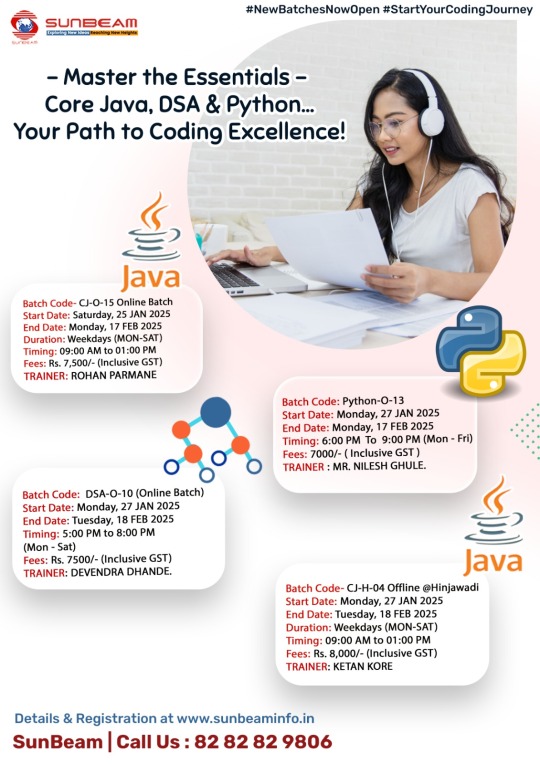
Elevate your IT expertise with Sunbeam Institute's comprehensive modular courses in Pune. Designed for both budding professionals and seasoned experts, our programs offer in-depth knowledge and practical skills to excel in today's dynamic tech industry.
Course Offerings:
Advance Java with Spring Hibernate
Duration: 90 hours
Overview: Master advanced Java programming and integrate with Spring and Hibernate frameworks for robust enterprise applications.
Python Development
Duration: 40 hours
Overview: Gain proficiency in Python programming, covering fundamental to advanced topics for versatile application development.
Data Structures and Algorithms
Duration: 60 hours
Overview: Understand and implement essential data structures and algorithms to optimize problem-solving skills.
DevOps
Duration: 80 hours
Overview: Learn the principles and tools of DevOps to streamline software development and deployment processes.
Machine Learning
Duration: 40 hours
Overview: Delve into machine learning concepts and applications, preparing you for the evolving AI landscape.
Why Choose Sunbeam Institute?
Experienced Faculty: Learn from industry experts with extensive teaching and real-world experience.
Hands-on Training: Engage in practical sessions and projects to apply theoretical knowledge effectively.
State-of-the-Art Infrastructure: Benefit from modern labs and resources that foster an optimal learning environment.
Placement Assistance: Leverage our strong industry connections to secure promising career opportunities.
#python course in pune#advanced python classes pune#c programming#core java course#devops classes in pune#data structures algorithms
0 notes
Text
just endure the suffering (data structures and algorithms)

5 notes
·
View notes
Text
youtube
Statistics - A Full Lecture to learn Data Science (2025 Version)
Welcome to our comprehensive and free statistics tutorial (Full Lecture)! In this video, we'll explore essential tools and techniques that power data science and data analytics, helping us interpret data effectively. You'll gain a solid foundation in key statistical concepts and learn how to apply powerful statistical tests widely used in modern research and industry. From descriptive statistics to regression analysis and beyond, we'll guide you through each method's role in data-driven decision-making. Whether you're diving into machine learning, business intelligence, or academic research, this tutorial will equip you with the skills to analyze and interpret data with confidence. Let's get started!
#education#free education#technology#educate yourselves#educate yourself#data analysis#data science course#data science#data structure and algorithms#youtube#statistics for data science#statistics#economics#education system#learn data science#learn data analytics#Youtube
4 notes
·
View notes
Text
(practicing dsa) is somebody gonna match my leet
#dsa#data structures and algorithms#leetcode#😀#recently i’ve just been spiraling on leet code#computer science
10 notes
·
View notes
Text
The feminine urge to code a silly little text based lesbian romance sim instead of taking this coding exam
#ughhhhhh it’s like data structures and algorithms and it’s been too long since college#and I have the interview on Thursday#it’s gonna be a long week#see how this post was just a secret way for me to whine and complain#lmao
2 notes
·
View notes
Text
7 Growth Functions in Data Structures: Behind asymptotic notations
Top coders use these to calculate time complexity and space complexity of algorithms.
https://medium.com/competitive-programming-concepts/7-growth-functions-in-data-structures-behind-asymptotic-notations-0fe44330daef
#software#programming#code#data structures#algorithm#algo trading#datastructures#data#datascience#data analytics
3 notes
·
View notes
Text
Normally I just post about movies but I'm a software engineer by trade so I've got opinions on programming too.
Apparently it's a month of code or something because my dash is filled with people trying to learn Python. And that's great, because Python is a good language with a lot of support and job opportunities. I've just got some scattered thoughts that I thought I'd write down.
Python abstracts a number of useful concepts. It makes it easier to use, but it also means that if you don't understand the concepts then things might go wrong in ways you didn't expect. Memory management and pointer logic is so damn annoying, but you need to understand them. I learned these concepts by learning C++, hopefully there's an easier way these days.
Data structures and algorithms are the bread and butter of any real work (and they're pretty much all that come up in interviews) and they're language agnostic. If you don't know how to traverse a linked list, how to use recursion, what a hash map is for, etc. then you don't really know how to program. You'll pretty much never need to implement any of them from scratch, but you should know when to use them; think of them like building blocks in a Lego set.
Learning a new language is a hell of a lot easier after your first one. Going from Python to Java is mostly just syntax differences. Even "harder" languages like C++ mostly just mean more boilerplate while doing the same things. Learning a new spoken language in is hard, but learning a new programming language is generally closer to learning some new slang or a new accent. Lists in Python are called Vectors in C++, just like how french fries are called chips in London. If you know all the underlying concepts that are common to most programming languages then it's not a huge jump to a new one, at least if you're only doing all the most common stuff. (You will get tripped up by some of the minor differences though. Popping an item off of a stack in Python returns the element, but in Java it returns nothing. You have to read it with Top first. Definitely had a program fail due to that issue).
The above is not true for new paradigms. Python, C++ and Java are all iterative languages. You move to something functional like Haskell and you need a completely different way of thinking. Javascript (not in any way related to Java) has callbacks and I still don't quite have a good handle on them. Hardware languages like VHDL are all synchronous; every line of code in a program runs at the same time! That's a new way of thinking.
Python is stereotyped as a scripting language good only for glue programming or prototypes. It's excellent at those, but I've worked at a number of (successful) startups that all were Python on the backend. Python is robust enough and fast enough to be used for basically anything at this point, except maybe for embedded programming. If you do need the fastest speed possible then you can still drop in some raw C++ for the places you need it (one place I worked at had one very important piece of code in C++ because even milliseconds mattered there, but everything else was Python). The speed differences between Python and C++ are so much smaller these days that you only need them at the scale of the really big companies. It makes sense for Google to use C++ (and they use their own version of it to boot), but any company with less than 100 engineers is probably better off with Python in almost all cases. Honestly thought the best programming language is the one you like, and the one that you're good at.
Design patterns mostly don't matter. They really were only created to make up for language failures of C++; in the original design patterns book 17 of the 23 patterns were just core features of other contemporary languages like LISP. C++ was just really popular while also being kinda bad, so they were necessary. I don't think I've ever once thought about consciously using a design pattern since even before I graduated. Object oriented design is mostly in the same place. You'll use classes because it's a useful way to structure things but multiple inheritance and polymorphism and all the other terms you've learned really don't come into play too often and when they do you use the simplest possible form of them. Code should be simple and easy to understand so make it as simple as possible. As far as inheritance the most I'm willing to do is to have a class with abstract functions (i.e. classes where some functions are empty but are expected to be filled out by the child class) but even then there are usually good alternatives to this.
Related to the above: simple is best. Simple is elegant. If you solve a problem with 4000 lines of code using a bunch of esoteric data structures and language quirks, but someone else did it in 10 then I'll pick the 10. On the other hand a one liner function that requires a lot of unpacking, like a Python function with a bunch of nested lambdas, might be easier to read if you split it up a bit more. Time to read and understand the code is the most important metric, more important than runtime or memory use. You can optimize for the other two later if you have to, but simple has to prevail for the first pass otherwise it's going to be hard for other people to understand. In fact, it'll be hard for you to understand too when you come back to it 3 months later without any context.
Note that I've cut a few things for simplicity. For example: VHDL doesn't quite require every line to run at the same time, but it's still a major paradigm of the language that isn't present in most other languages.
Ok that was a lot to read. I guess I have more to say about programming than I thought. But the core ideas are: Python is pretty good, other languages don't need to be scary, learn your data structures and algorithms and above all keep your code simple and clean.
#programming#python#software engineering#java#java programming#c++#javascript#haskell#VHDL#hardware programming#embedded programming#month of code#design patterns#common lisp#google#data structures#algorithms#hash table#recursion#array#lists#vectors#vector#list#arrays#object oriented programming#functional programming#iterative programming#callbacks
20 notes
·
View notes
Text
if ur gonna write a textbook with java in it maybe learn java naming conventions first
2 notes
·
View notes
Text
What Dijkstra's two-stack algorithm does to Left parenthesis of Infix expression is everyone does to me
.
.
.
IGNORE 🤡
7 notes
·
View notes
Text
Exploring Quantum Leap Sort: A Conceptual Dive into Probabilistic Sorting Created Using AI
In the vast realm of sorting algorithms, where QuickSort, MergeSort, and HeapSort reign supreme, introducing a completely new approach is no small feat. Today, we’ll delve into a purely theoretical concept—Quantum Leap Sort—an imaginative algorithm created using AI that draws inspiration from quantum mechanics and probabilistic computing. While not practical for real-world use, this novel…
#AI#algorithm#amazon#chatgpt#coding#computer science#css#data-structures#DSA#engineering#google#heapsort#insertionsort#javascript#mergesort#new#programming#python#quicksort#radixsort#sorting#tech#tesla#trending#wipro
2 notes
·
View notes
Text
Enhance Your Coding Skills with Data Structures and Algorithms Classes at Sunbeam Institute, Pune
Elevate your programming expertise by enrolling in the Data Structures and Algorithms course at Sunbeam Institute, Pune. This comprehensive program is designed for students, freshers, and working professionals aiming to deepen their understanding of essential data structures and algorithms using Java.
Course Highlights:
Algorithm Analysis: Learn to evaluate time and space complexity for efficient coding.
Linked Lists: Master various types, including singly, doubly, and circular linked lists.
Stacks and Queues: Understand their implementation using arrays and linked lists, and apply them in expression evaluation and parenthesis balancing.
Sorting and Searching: Gain proficiency in algorithms like Quick Sort, Merge Sort, Heap Sort, Linear Search, Binary Search, and Hashing.
Trees and Graphs: Explore tree traversals, Binary Search Trees (BST), and graph algorithms such as Prim’s MST, Kruskal’s MST, Dijkstra's, and A* search.
Course Details:
Duration: 60 hours
Schedule: Weekdays (Monday to Saturday), 5:00 PM to 8:00 PM
Upcoming Batch: January 27, 2025, to February 18, 2025
Fees: ₹7,500 (including 18% GST)
Prerequisites:
Basic knowledge of Java programming, including classes, objects, generics, and Java collections (e.g., ArrayList).
Why Choose Sunbeam Institute?
Sunbeam Institute is renowned for its effective IT training programs in Pune, offering a blend of theoretical knowledge and practical application to ensure a thorough understanding of complex concepts.
Enroll Now: Secure your spot in this sought-after course to advance your programming skills and enhance your career prospects. For registration and more information, visit:
#Data Structures Algorithms#Programming Courses#Sunbeam Institute Pune#Java Training#Coding Classes#Pune IT Training
0 notes
Text


// August 18th, 2024
Yesterday I broke in tears because I think I’m going to fail Data Structures and Algorithms this semester. It’s just, too much. Not the topics I have to study, not even that I don’t actually enjoy practicing it, oh no. It’s that I don’t think I’m going to be able to send all of my assignments on time and they affect the final grade a lot. The materials for all three subjects get released only on Wednesdays at noon and it’s expected that an almost impossible amount of assignments are delivered before the following Tuesday at 8 p.m.
Why can’t I, for instance, do the work, send it as soon as I have it ready, and they can just take into account that I actually followed on the lessons and studied hard for the two exams before the final? It’s just… I don’t know. It seems ridiculous to me. I would be doing my best even without having that stupid pressure of doing the assignments on time, like any other person who is serious about theirs studies. I know I probably sound like a stupid kid, but people going to this university at night usually have a job already, otherwise, why wouldn’t we be taking the lessons on mornings/afternoons? Don’t they think about those cases? Incredible.
And I know one can probably think, “well, why don’t you drop that subject and follow up others and retake this one further in the future?
And the answer to that is, a) I’m feeling old to keep postponing my graduation (35 is becoming my least worst shot) and b) I have more plans, like for other important aspects of my life as well. And… ugh. The pressure. It’s too much.
I spoke to my sweet boyfriend about all these worries I have and he’s happy with both me telling him what I feel and how hard I am working with this. “Honey, it’s just the second week of the semester. You got this”. Cuddles and sushi were provided, and even when that didn’t wash the worries or pressure away, I felt loved. And cared for. I’m so lucky to have him in my life.
Sorry for the rant guys. I get that this is just the way it is and that these are the terms for getting a good grade, and if I don’t like it I can just leave it and try again, but… I just needed to get some of it out of my chest 🥲
But hey, at least I was able to write my very first little programs in C yesterday. Yay 🍷
#studyblr#my post#shelikesrainydays#pressure#being and adult and a student is so freaking hard#personal rant#data structures#algorithms#C#paulastudies
2 notes
·
View notes
Text
youtube
Data Structure and Algorithms in JAVA | Full Course on Data Structure
In this course, we are going to discuss Data Structures and Algorithms using Java Programming. The data structure is a way to store and organize data so that it can be used efficiently. It is a set of concepts that we can use in any programming language to structure the data in the memory. Data structures are widely used in almost every aspect of computer science i.e. operating systems, computer science, compiler design, Artificial Intelligence, graphic,s and many more. Some examples of Data structures that we are going to cover in this course are arrays, linked lists, stack, queue, Binary Tree, Binary Search Tree, Graphs, etc. Apart from knowing these data structures, it's also important to understand the algorithmic analysis of a given code. Different Sorting and searching techniques will be talked about with their implementation in java programming. Lastly, this course contains information on the Greedy approach, Dynamic approach, and divide and Conquer approach to programming.
#youtube#free education#education#educate yourselves#technology#educate yourself#data structures#data analytics#Data Structure and Algorithms in JAVA#javaprogramming#Data Structure and Algorithms#how to think like a programmer#programming classes#programming
3 notes
·
View notes
Text
41/196
When your passion and purpose align, you won't be chasing your dreams - they'll be magnetically drawn to you. Focus, dedication, and clarity create an irresistible pull that attracts success.
-Your Ambition-lessness won't pay your bills, DSA will.

#data structures and algorithms#196series#dark academia#focus#consistency#dream#ambitious#dedication#passion#coding#spongebob#DSA
3 notes
·
View notes
Text

Summer Internship Program 2024
For More Details Visit Our Website - internship.learnandbuild.in
#machine learning#programming#python#linux#data science#data scientist#frontend web development#backend web development#salesforce admin#salesforce development#cloud AI with AWS#Internet of things & AI#Cyber security#Mobile App Development using flutter#data structures & algorithms#java core#python programming#summer internship program#summer internship program 2024
2 notes
·
View notes
Text

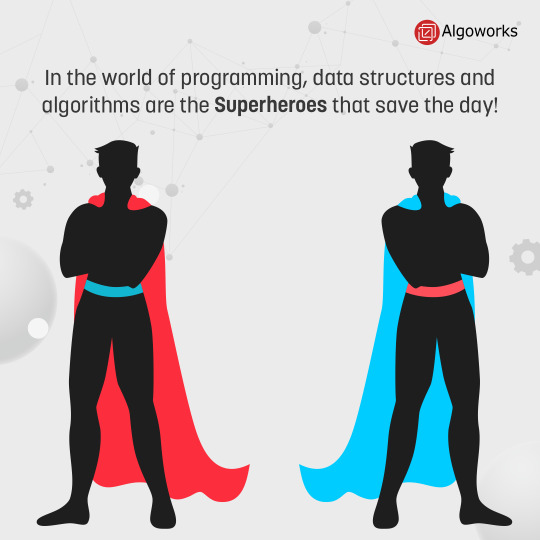
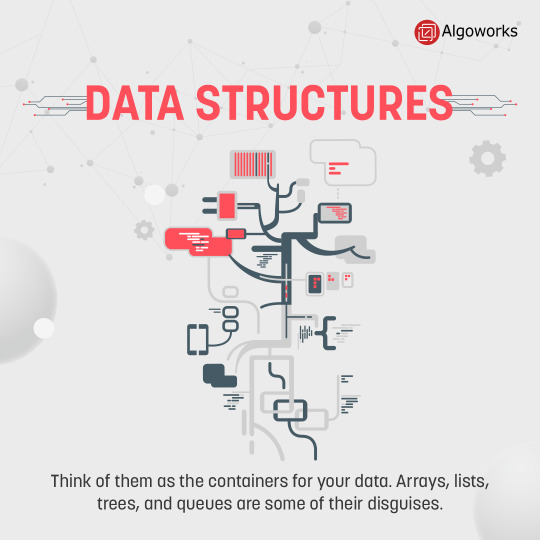
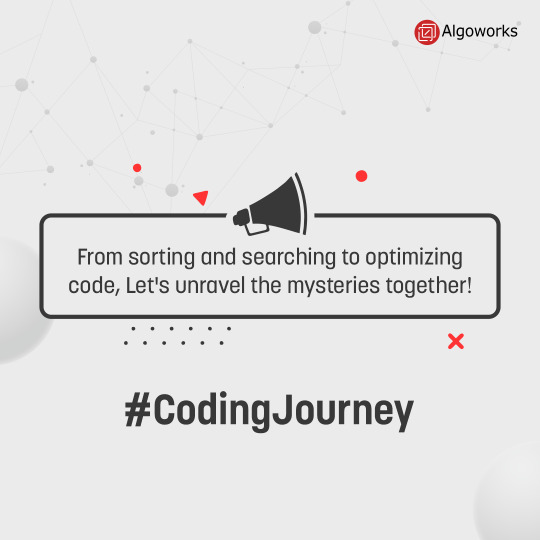
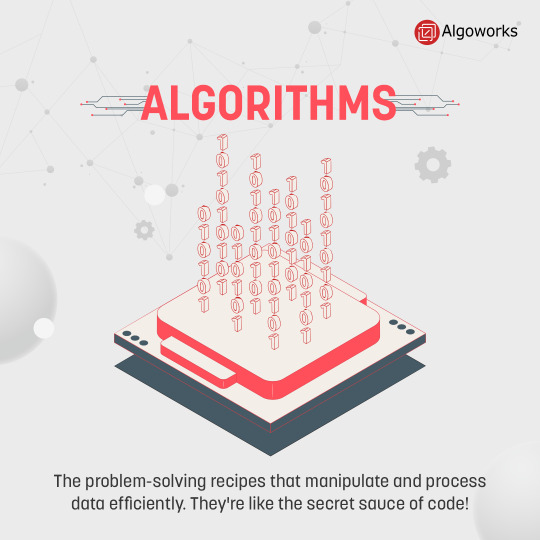
Unleash the coding superheroes! 💻🚀
In the dynamic realm of programming, data structures and algorithms emerge as our formidable superheroes, shaping the digital world one efficient line of code at a time. 🦸♂️💡
3 notes
·
View notes